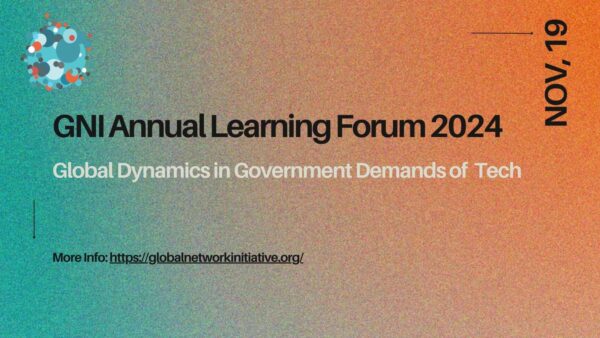
Read Event Summary
On November 19 and 20, the Global Network Initiative (GNI) and its membership will convene in Washington D.C. for a series of meetings and events that will bring together experts from across the fields of human rights, tech governance, trust & safety, AI, and corporate accountability. Over these two days, GNI will host our Q4 Board meeting and a broader meeting for members, as well as an invited workshop with the Atlantic Council’s Digital Forensic Research Lab: Strategic Priorities for the Internet Governance Landscape in 2025, and our public Annual Learning Forum – described below.
GNI Annual Learning Forum 2024: “Global Dynamics in Government Demands of Tech: Respecting Digital Rights Amidst Changing Regulatory, Technical, and Political Landscapes”
The Annual Learning Forum will explore new dimensions and trends in government demands and mandates, particularly as they relate to generative AI products and services at the Internet’s infrastructure level. The digital landscape is changing quickly at the national and international level. These changes are being shaped by new and proposed regulatory regimes for corporate accountability, rising authoritarianism, renewed calls for digital sovereignty – particularly in the context of AI, civic spaces closing, opaque new AI technologies rolling out quickly, and the technical infrastructure that underpins the Internet becoming ever more critical. In these contexts, how can practitioners best protect human rights, including freedom of expression and privacy, against government overreach and unintended consequences?
High-level agenda [subject to change]
- 2:00-2:05:
- Welcome from venue host Cheryl Miller, Vice President, Digital Policy at the US Council for International Business
- 2:05-2:10:
- Opening Remarks from Vicky Bowman, Independent Chair of the Global Network Initiative
- 2:10-2:20:
- Keynote Remarks from Dafna Rand, Assistant Secretary of State for Democracy, Human Rights, and Labor (DRL)
- 2:20-3:10
- Session 1: Dynamics in Government Demands Amidst Changing Regulatory and Political Landscapes
This opening session offers a deep dive into recent tech regulatory regimes focused on corporate accountability. GNI has analyzed and commented on many of these initiatives, repeatedly calling for them to be consistent with and anchored in the time-tested, globally applicable human rights framework. As these practices transition from norms-based to formal requirements, we cannot lose sight of the government’s potential to repress rights through the implementation of these regimes.
The session will explore what we know about the risks of government overreach from these approaches. What safeguards exist that GNI’s members can advocate for to protect digital rights in this changing context? What else is needed?
Speakers:
- Allie Funk – Freedom House – moderator
- Thobekile Matimbe – Paradigm Initiative
- Shashank Mohan – Centre for Communication Governance at National Law University Delhi
- Catalina Moreno – Karisma
- Alex Walden – Google
- 3:10-3:30
- Refreshment Break
- 3:30-4:20
- Session 2: Exploring the Human Rights Implications of Government Influence over AI
On top of the changing regulatory and political landscapes, AI technologies – especially generative AI – are rapidly accelerating. Amidst this broad landscape, how might governments impact freedom of expression and privacy through their investments, procurement, use, and regulation of AI technologies?
GenAI is an information and communication technology, and shares many commonalities with previous generations of these technologies, including its ability to impact freedom of expression and privacy. However, genAI has some important differences and distinctions. This session will dig into the risks and possibilities of government influence over AI products – including genAI – that could impact people’s freedom of expression and privacy. We will consider and explore nascent types of government demands, how these are surfacing in emerging regulatory frameworks, and the GNI Framework in this context.
Speakers:
- Jason Pielemeier – GNI – moderator
- Alex Warofka – Meta
- Miranda Bogen – Center for Democracy & Technology
- J. Carlos Lara – Derechos Digitales
- Ellie McDonald – Global Partners Digital
- 4:20-5:15
- Session 3: New Developments in Censorship and Surveillance at the Infrastructure-Level
As people’s lives become more digitally mediated, the technical infrastructure that underpins the Internet is increasingly critical. Yet, globally, there is an emerging trend that states are relying more heavily on infrastructure as a tool of censorship and surveillance.
There are three fundamental techniques that network operators can use to enforce content restrictions on traffic traversing their networks: Domain Name System (DNS) control or interference, Internet Protocol (IP) address blocking, and targeted connection tampering. Researchers from Cloudflare will explain the technical phenomenon of connection tampering and describe how insights into this practice in various networks around the world – with focuses on the Pakistani, African, and Brazilian contexts – can be gleaned from Cloudflare Radar’s new dataset.
Speakers:
- Ramsha Jahangir – GNI – moderator
- Usama Khiliji – Bolo Bhi, and Vice Chair of the Global Network Initiative
- Heloisa Massaro – InternetLab
- Lillian Nalwoga – CIPESA
- Luke Valenta – Cloudflare
5:15-5:20 Closing Remarks from Elonnai Hickok, Managing Director of the Global Network Initiative